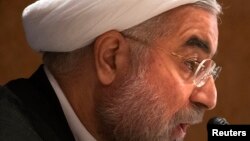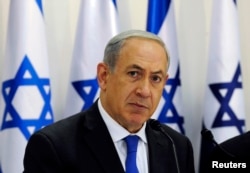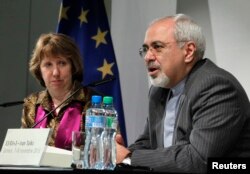DUBAI/GENEVA —
President Hassan Rouhani, architect of Iran's diplomatic opening to big powers, said on Sunday it would not yield to any threats or discrimination in an apparent bid to keep hardliners on side as Tehran edges toward a deal on its nuclear program.
He was speaking to the Iranian parliament, a bastion of conservatives, a day after the Islamic Republic and the six powers narrowed differences at talks in Geneva and decided to resume them on Nov. 20 to try to defuse a decade-old stand-off and fears of a drift towards a new Middle East war.
The sides seemed on the verge of a breakthrough before cracks materialized among U.S. and European allies as France declined to endorse the proposal under discussion, believing it did not adequately neutralize the risk of an Iranian atom bomb.
French Foreign Minister Laurent Fabius told France Inter radio that Paris desired a nuclear settlement with Iran but could not accept a "fool's game" - in other words, a weak deal.
Diplomats said the main stumbling blocks included the status of Iran's Arak heavy-water reactor of potential use in making bomb-grade plutonium, the fate of Iran's stockpile of higher-enriched uranium - both acute issues for France - and the extent of relief from trade sanctions demanded by Tehran.
Israel, which calls Iran's nuclear activity a mortal threat, denounced the interim deal taking shape in Geneva as it would have let Iran retain some enrichment capacity rather than dismantle it, while giving Tehran respite from sanctions.
Prime Minister Benjamin Netanyahu served notice that Israel would not feel bound by such a deal, unmistakably reiterating a veiled threat to take military action if it deems diplomacy to restrain Iran's nuclear ambitions a dead end.
Rouhani told the Iranian parliament that his negotiators had told their big power interlocutors in Geneva, "We will not answer to any threat, sanction, humiliation or discrimination."
He did not elaborate on his reference to threats against Iran, but Netanyahu's condemnation of the talks loomed large, as did the ideological resistance of Iranian conservatives to any mending of fences with the West.
By "discrimination" and "humiliation", he may have been alluding to pressure from hawks in the West for Iran to scrap its entire nuclear program, which Tehran says is wholly peaceful in nature.
"The Islamic Republic has not and will not bow its head to threats from any authority," Rouhani said. "For us there are red lines that cannot be crossed. National interests are our red lines that include our rights under the framework of international regulations and [uranium] enrichment in Iran."
Diplomatic opening from Tehran
The fact that any deal might be feasible after a decade of increasingly vitriolic confrontation between Iran and Western powers, shows the striking shift in the tone of Iranian foreign policy since Rouhani's landslide election victory in June.
Rouhani, a relative moderate, opened diplomatic windows to a nuclear compromise to alleviate economic sanctions that have throttled the OPEC giant's lifeblood oil industry and cut it off from the international banking system.
He has won crucial public backing from Supreme Leader Ayatollah Ali Khamenei, Iran's ultimate authority, who - despite his profound suspicion of Washington - has warned hardline loyalists not to challenge the negotiating path.
Rouhani has repeated Iran's longtime insistence on a right to a sovereign nuclear energy industry as a member of the Non-Proliferation Treaty. Most diplomats concede that, as Tehran has expanded its nuclear capacity exponentially since 2006, the time for demanding a total shutdown - although enshrined in several U.N. Security Council resolutions - has now passed.
The Islamic Republic says its nuclear activities are purely peaceful and its negotiators say they are ready to take steps necessary for a deal if their nuclear "rights are recognized" and world powers reciprocate by relaxing sanctions.
Fabius's sharp remarks rankled with others in the Western camp. But U.S. Secretary of State John Kerry played down suggestions of a rift as the talks ended late on Saturday, saying, "I think tonight there is a unity in our position and a unity in the purpose as we leave here."
European Union foreign policy chief Catherine Ashton said senior political officials from Iran and the five permanent U.N. Security Council members plus Germany would meet again on Nov. 20 to work on a deal. Kerry told reporters that an agreement could be within reach.
"There is no question in my mind that we are closer now as we leave Geneva than we were when we came and that with good work and good faith over the course of the next weeks, we can, in fact, secure our goal," Kerry said.
Gaps narrowed, differences clarified
"We came to Geneva to narrow the differences and I can tell you without any exaggeration we ... narrowed the differences and clarified those that remain," he said.
But he warned Tehran that Washington's desire for a diplomatic solution to the long-running dispute over Iran's nuclear program was not infinite, saying the window for diplomacy "does not stay open indefinitely."
Ministers from Iran and the major powers held a series of meetings late on Saturday in a final push for an outline of a deal that would freeze parts of Iran's nuclear program in exchange for sanctions relief. In the end, however, they chose to adjourn for 10 days.
Ashton and Iranian Foreign Minister Mohammad Javad Zarif said they hoped an agreement would be signed later this month.
"We have done some intense negotiations and discussions and our objective is to reach a conclusion and that's what we will come back to try and do," Ashton told reporters.
Zarif said, "We had a very good three days, very productive three days, and it is something we can build on."
The latest talks began on Thursday and Kerry unexpectedly arrived on Friday to help bridge differences and secure an agreement. From the time he arrived in Geneva, Kerry played down expectations of a deal.
Fabius, British Foreign Secretary William Hague and their counterparts from Russia and Germany, Sergei Lavrov and Guido Westerwelle, also attended, along with Chinese Vice Foreign Minister Li Baodong, demonstrating the six-nation group's commitment to reaching an agreement.
'On same wavelength'
Zarif, asked about the role Fabius played in the talks, did not criticize the French minister, saying disagreements at this stage of the negotiations were to be expected.
"It was natural that when we start dealing with the details there will be differences of views and we expect it," he said. "I am not disappointed at all because the meeting we just had ... was a good meeting."
"I think we are all on the same wavelength and that is important and that gives us the impetus to move forward when we meet again next time."
The powers remain concerned that Iran is continuing to amass enriched uranium not for future nuclear power stations, as Tehran says, but as potential fuel for nuclear warheads.
They are searching for a preliminary agreement that would restrain Iran's nuclear program and make it more transparent for U.N. anti-proliferation inspectors. In exchange, Tehran would obtain phased and initially limited relief from the sanctions throttling the economy of the giant OPEC state.
Iran and the six powers have been discussing a partial nuclear suspension deal lasting about six months. During that time, Iran and the six powers would negotiate a permanent agreement aimed at removing all concerns that Tehran is amassing the capability to produce nuclear weapons.
One concession under consideration is the disbursement to Iran, in installments, about $50 billion of Iranian funds blocked in foreign accounts for years.
Another step could be temporarily relaxing restrictions on precious metals trade and Washington suspending pressure on countries not to buy Iranian oil.
Negotiators have limited political room to maneuver as there is hard-line opposition to any diplomatic thaw both in Tehran - especially among its elite Revolutionary Guards and conservative Shi'ite clerics - and in the U.S. Congress.
Kerry appeared to respond to his critics in the U.S. legislature by saying, "This is an issue of such consequence that really needs to rise or fall on merits, not on politics."
He was speaking to the Iranian parliament, a bastion of conservatives, a day after the Islamic Republic and the six powers narrowed differences at talks in Geneva and decided to resume them on Nov. 20 to try to defuse a decade-old stand-off and fears of a drift towards a new Middle East war.
The sides seemed on the verge of a breakthrough before cracks materialized among U.S. and European allies as France declined to endorse the proposal under discussion, believing it did not adequately neutralize the risk of an Iranian atom bomb.
French Foreign Minister Laurent Fabius told France Inter radio that Paris desired a nuclear settlement with Iran but could not accept a "fool's game" - in other words, a weak deal.
Diplomats said the main stumbling blocks included the status of Iran's Arak heavy-water reactor of potential use in making bomb-grade plutonium, the fate of Iran's stockpile of higher-enriched uranium - both acute issues for France - and the extent of relief from trade sanctions demanded by Tehran.
Israel, which calls Iran's nuclear activity a mortal threat, denounced the interim deal taking shape in Geneva as it would have let Iran retain some enrichment capacity rather than dismantle it, while giving Tehran respite from sanctions.
Prime Minister Benjamin Netanyahu served notice that Israel would not feel bound by such a deal, unmistakably reiterating a veiled threat to take military action if it deems diplomacy to restrain Iran's nuclear ambitions a dead end.
Rouhani told the Iranian parliament that his negotiators had told their big power interlocutors in Geneva, "We will not answer to any threat, sanction, humiliation or discrimination."
He did not elaborate on his reference to threats against Iran, but Netanyahu's condemnation of the talks loomed large, as did the ideological resistance of Iranian conservatives to any mending of fences with the West.
By "discrimination" and "humiliation", he may have been alluding to pressure from hawks in the West for Iran to scrap its entire nuclear program, which Tehran says is wholly peaceful in nature.
"The Islamic Republic has not and will not bow its head to threats from any authority," Rouhani said. "For us there are red lines that cannot be crossed. National interests are our red lines that include our rights under the framework of international regulations and [uranium] enrichment in Iran."
Diplomatic opening from Tehran
The fact that any deal might be feasible after a decade of increasingly vitriolic confrontation between Iran and Western powers, shows the striking shift in the tone of Iranian foreign policy since Rouhani's landslide election victory in June.
Rouhani, a relative moderate, opened diplomatic windows to a nuclear compromise to alleviate economic sanctions that have throttled the OPEC giant's lifeblood oil industry and cut it off from the international banking system.
He has won crucial public backing from Supreme Leader Ayatollah Ali Khamenei, Iran's ultimate authority, who - despite his profound suspicion of Washington - has warned hardline loyalists not to challenge the negotiating path.
Rouhani has repeated Iran's longtime insistence on a right to a sovereign nuclear energy industry as a member of the Non-Proliferation Treaty. Most diplomats concede that, as Tehran has expanded its nuclear capacity exponentially since 2006, the time for demanding a total shutdown - although enshrined in several U.N. Security Council resolutions - has now passed.
The Islamic Republic says its nuclear activities are purely peaceful and its negotiators say they are ready to take steps necessary for a deal if their nuclear "rights are recognized" and world powers reciprocate by relaxing sanctions.
Fabius's sharp remarks rankled with others in the Western camp. But U.S. Secretary of State John Kerry played down suggestions of a rift as the talks ended late on Saturday, saying, "I think tonight there is a unity in our position and a unity in the purpose as we leave here."
European Union foreign policy chief Catherine Ashton said senior political officials from Iran and the five permanent U.N. Security Council members plus Germany would meet again on Nov. 20 to work on a deal. Kerry told reporters that an agreement could be within reach.
"There is no question in my mind that we are closer now as we leave Geneva than we were when we came and that with good work and good faith over the course of the next weeks, we can, in fact, secure our goal," Kerry said.
Gaps narrowed, differences clarified
"We came to Geneva to narrow the differences and I can tell you without any exaggeration we ... narrowed the differences and clarified those that remain," he said.
But he warned Tehran that Washington's desire for a diplomatic solution to the long-running dispute over Iran's nuclear program was not infinite, saying the window for diplomacy "does not stay open indefinitely."
Ministers from Iran and the major powers held a series of meetings late on Saturday in a final push for an outline of a deal that would freeze parts of Iran's nuclear program in exchange for sanctions relief. In the end, however, they chose to adjourn for 10 days.
Ashton and Iranian Foreign Minister Mohammad Javad Zarif said they hoped an agreement would be signed later this month.
"We have done some intense negotiations and discussions and our objective is to reach a conclusion and that's what we will come back to try and do," Ashton told reporters.
Zarif said, "We had a very good three days, very productive three days, and it is something we can build on."
The latest talks began on Thursday and Kerry unexpectedly arrived on Friday to help bridge differences and secure an agreement. From the time he arrived in Geneva, Kerry played down expectations of a deal.
Fabius, British Foreign Secretary William Hague and their counterparts from Russia and Germany, Sergei Lavrov and Guido Westerwelle, also attended, along with Chinese Vice Foreign Minister Li Baodong, demonstrating the six-nation group's commitment to reaching an agreement.
'On same wavelength'
Zarif, asked about the role Fabius played in the talks, did not criticize the French minister, saying disagreements at this stage of the negotiations were to be expected.
"It was natural that when we start dealing with the details there will be differences of views and we expect it," he said. "I am not disappointed at all because the meeting we just had ... was a good meeting."
"I think we are all on the same wavelength and that is important and that gives us the impetus to move forward when we meet again next time."
The powers remain concerned that Iran is continuing to amass enriched uranium not for future nuclear power stations, as Tehran says, but as potential fuel for nuclear warheads.
They are searching for a preliminary agreement that would restrain Iran's nuclear program and make it more transparent for U.N. anti-proliferation inspectors. In exchange, Tehran would obtain phased and initially limited relief from the sanctions throttling the economy of the giant OPEC state.
Iran and the six powers have been discussing a partial nuclear suspension deal lasting about six months. During that time, Iran and the six powers would negotiate a permanent agreement aimed at removing all concerns that Tehran is amassing the capability to produce nuclear weapons.
One concession under consideration is the disbursement to Iran, in installments, about $50 billion of Iranian funds blocked in foreign accounts for years.
Another step could be temporarily relaxing restrictions on precious metals trade and Washington suspending pressure on countries not to buy Iranian oil.
Negotiators have limited political room to maneuver as there is hard-line opposition to any diplomatic thaw both in Tehran - especially among its elite Revolutionary Guards and conservative Shi'ite clerics - and in the U.S. Congress.
Kerry appeared to respond to his critics in the U.S. legislature by saying, "This is an issue of such consequence that really needs to rise or fall on merits, not on politics."







